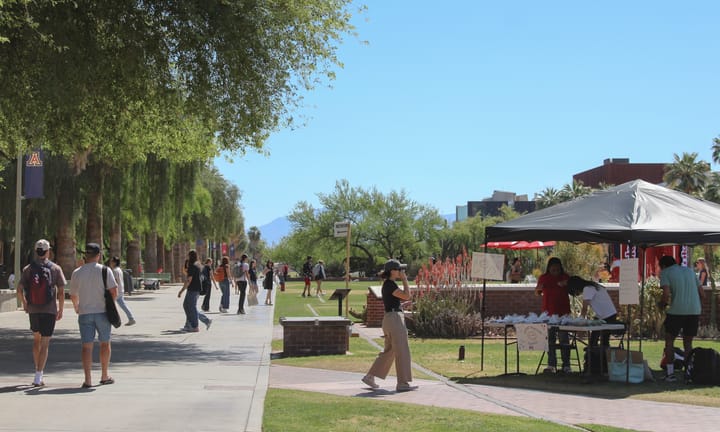Retired Tucson judge offers free ear acupuncture for healing
Retired federal judge Chuck Pyle provides free ear acupuncture in Tucson to help the community manage trauma, stress, and addiction without judgment or stigma.

When Chuck Pyle places needles in his clients’ ears in his South Tucson studio every Sunday, he doesn’t ask too many questions.
He won’t ask them about their habits, mental health status or even give them advice on how to improve their overall health.
The only thing he’ll say is, “Good to see you,” or, “Nice to have you again this week.”
Pyle is a practitioner of AcuWellness 5NP, a protocol that addresses behavioral health issues by placing thin stainless steel needles in five traditional acupuncture points in the ear.
“One of the important things we emphasize in the training is, ‘You’re here to safely place and remove five needles in each ear. You’re not here to give life advice,’” he said.
The 54-year-old first came to the desert to practice law, not medicine. He spent 17 years as a federal judge, overseeing drug trafficking and human smuggling cases, given his courtroom’s proximity to the border.
Pyle retired from the bench in 2017, but was called back to assist in Flagstaff for six months while the sitting judge battled an illness.
Working largely with Native American defendants, Pyle said the experience taught him an appreciation for the culture and therapies that Indigenous communities used to address trauma, addiction and more.
At the end of 2021, a change to Arizona law allowed for any person who has undergone 5NP training to become certified in ear acupuncture.
Since April 2022, Pyle has been providing the service regularly to anyone who comes into his Sunday afternoon clinic – free of change.
Decades before Pyle opened his clinic, soldiers from Vietnam were returning in the mid-70’s to the Bronx addicted to heroin. At the time, these ex-soldiers were bearing the hardship of a lack of accessible healthcare in their area – particularly those in marginalized, low-income communities.
The Black Panther activist group, a revolutionary party intended to protect people from police brutality, began to look elsewhere for healthcare. After coming across a surgeon in Hong Kong who used ear acupuncture as anesthesia, members of the organization traveled to China to learn more about the acupuncture movement.
Doctors there were discovering that through ear acupuncture therapy, many patients were discovering they could no longer get high from opium – it was relieving their drug withdrawal syndromes.

Back in America, this newfound acu-therapy movement began to take off. Amidst the crack-cocaine epidemic of the 80’s, those with no medical background began learning how to do this health treatment – including Mutulu Shakur, Tupac Shakur’s stepfather.
The needle therapy was found to help people detox from methadone, and practitioners began using it amongst other marginalized communities, specifically those living with HIV. As the years went on, the practice became more popular and with that came the discovery of its numerous benefits.
After the 9/11 terrorist attack, hundreds of first-responders and survivors were admitted to St. Vincent’s – a psychiatric ER just three blocks from ground zero.
As Pyle described, none of these patients wanted to talk to a therapist about what they had been through.
“At St. Vincent’s they were already using the ear acupuncture for addiction,” he said. “And they had no idea it would help with trauma.”
More than two decades later, here in Tucson, Pyle and his team provide that same treatment the Black Panther’s discovered back in the 1970’s.
Approaching his almost three-year acupuncture certification mark, Pyle calls the treatment a “non-verbal, non-diagnostic therapy.”
“That makes it sound like it’s worthless, but it’s actually what’s particularly important about it,” he said.
The Sunday clinics, which run from 2 to 4 p.m., aim to assist peoplewho may be dealing with trauma, severe stress or addiction.
Unlike other kinds of perhaps more traditional treatment settings, the patients don’t have to worry about being asked any questions that may be triggering, or stigmatizing. In Pyle’s words, all they’ll be asked is if they’d like to try it. Now, almost three years later, he says he has done over 1,000 treatments.
Sergio Hero, a Tucson-resident and medical caregiver, is a regular at the clinic.
“It’s good therapeutic sessions that Chuck and (his wife) Novi give,” he said. “They help out the community, they give it as a charity for free to everyone who knows about it.”

While Hero doesn’t struggle with addiction himself, he says he believes it can cure anxiety and even help with weight loss. Since seeing it advertised in a newspaper six months ago, he’s been coming back ever since.
Pyle says the turnout each Sunday can be as many as 20 people, so he’s seeking additional funding so his trainees can be compensated for their work. It’s important to him to train people who may not necessarily have a health background, and be able to give them that access without putting any financial or bureaucratic burdens on them.
“Our strategy now is that we’re going to go after some small grants and figure out ways to compensate the technicians to go and place the needles,” he said. “The cost of the 10 needles, an alcohol wipe and a Q-tip is about 70 cents.”
Alice Webb, a newly certified acupuncture specialist, first found out about the practice when she was working in a recovery center for eating disorders.
“It’s really exciting,” she said. “It used to be that you had to be a nurse practitioner or medical doctor to get this training, but Chuck has worked with the legislation here in Arizona.”
The process to getting certified was easy, she said, but not free. It’s $300 to $400 for a three-day class, with seven to eight hours each day of training.
“Since I’ve become aware of acupuncture, I can see there are a lot of barriers to accessing it,” she said. “I really love that it’s a way to bring it to everybody.”
Right now, Pyle’s nonprofit is active here in Tucson at two sites. Next year, he hopes to triple that to six. And when it comes to the response from the community, Pyle describes his patients as “extraordinarily grateful.”
“This is a population that is frequently either invisible to the rest of the community, or stigmatized by the rest of the community,” he said. “Neither of which is particularly supportive.”
And while Pyle may not think the practice is a cure-all, he can guarantee one thing.
“Once the needles are in, you’ll feel calm.”
Olivia Krupp is a journalism major at the University of Arizona and Tucson Spotlight intern. Contact her at oliviakrupp@arizona.edu.
Tucson Spotlight is a community-based newsroom that provides paid opportunities for students and rising journalists in Southern Arizona. Please support our work with a paid subscription.




